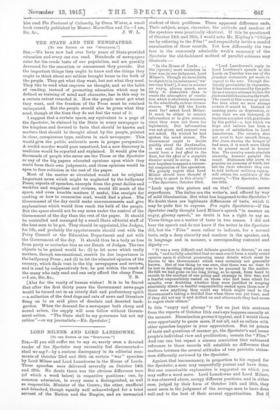THE STATE AND THE NEWSPAPERS.
[To THE EDITOR Or THE "SPECTATOR."' Sin,—We have now had over forty years of State-provided education and every one can read. Hundreds of newspapers cater for the crude taste of our population, and are greedily devoured for the sensation or amusement they provide. But the important things they ought to know and the things they ought to think about are seldom brought home to the bulk of the people. They get what they want, but not what they need. They like to read what requires no thought, and so the habit bf reading, instead of promoting education which may be defined as training of mind and character, has in this way to a certain extent retarded it. Now the people must get what they want, and the freedom of the Press must be retained unimpaired. But the people should also be given what they need, though at the time they do not feel the want of it.
I suggest that a certain space, say equivalent to a page of the Spectator, be claimed by the State in every newspaper in the kingdom and devoted to facts that should be known and matters that should be thought about by the people, printed in clear, conspicuous type, uniform in each newspaper. This would give the public authentic news in proper perspective. A sordid murder would pass unnoticed, but a new discovery in medicine would be reported and explained. It would give the thousands of people who never see the Times or the Spectator or any of the big papers educated opinions upon which they could form their own judgments, and these opinions would be open to free criticism in the rest of the paper. Most of the matter so circulated would not be original. Important news which might be neglected by the halfpenny Press, reports of speeches, excerpts from the great dailies and weeklies and magazines and reviews, would fill much of the space, and even humble matters if useful, like receipts for cooking or how to economize coal, would find a place. The Government of the day could make announcements and give explanations which would thus reach the bulk of the people. But the space should not be any more under the control of the Government of the day than the rest of the paper. It should be controlled and managed by a email State editorial staff of the best men to be got. They should be appointed, like Judges, for life, and probably the appointments should rest with the Privy Council or the Education Department and not with the Government of the day. It should thus be a body as free from party or sectarian bias as our Bench of Judges. The two objects to be gained would be : (1) to let news which really matters, though unsensational, receive its due importance in the halfpenny Press ; and (2) to let the educated opinion of the country, which finds vent in the big newspapers and reviews, and is read by comparatively few, be put within the reach of the many who only read and can only afford the cheap Press.
am, Sir, ezc., T. B. [Alas for the vanity of human wishes I It is to be feared that after the first thirty years the Government news-page would be turned out in an utterly dull and perfunctory spirit collection of the dead dogs and cats of news and literature flung on to an arid piece of desolate and deserted back- garden. When the demand for a newspaper both cheap and sound arises, the supply will soon follow without Govern. ment action. "The State shall be my governors but not my critics "—or my journalists.—En. Spectator.]






































 Previous page
Previous page